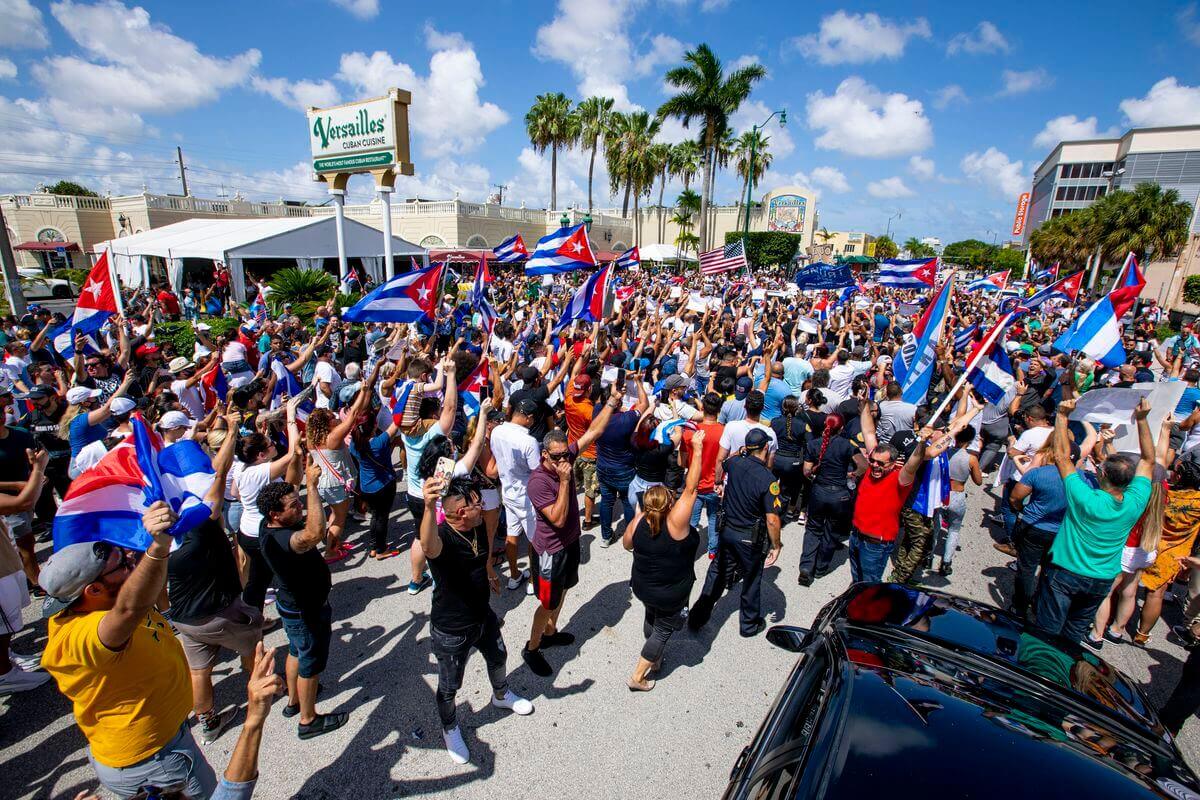On Sunday, tens of thousands of Cuban citizens took the streets of cities across the country to protest against shortages of food, medicine, and electricity, rising prices, the slow pace of the COVID-19 vaccination programme, and general economic conditions. The protests mark a historic occasion in a country where such anti-government demonstrations are extremely rare, with the last such protest taking place in 1994. Demonstrators have chanted “down with the dictatorship,” “we want liberty,” “we are no longer afraid,” “we want vaccines,” “enough,” “freedom,” and “unite.”
In response, authorities shut down internet access during the afternoon. There were also reports of security forces aggressively suppressing the protesters and media personnel, with several demonstrators arrested. Meanwhile, President Miguel Díaz-Canel has alleged that the protests are being propelled by the United States (US) and Cuban-Americans.
He said, “As if a pandemic outbreak did not exist around the world, the Cuban-American mafia paid influential people and YouTubers very well on social media to create the entire campaign.” He further warned, “We are not going to allow any counterrevolutionary, mercenary, sold to the American empire, to provoke destabilization.” To this end, he vowed a “revolutionary response” by the Communists and said they were ready for a “fight,” in what has been interpreted as a call to arms.
The US government has offered its support to the protesters, with National Security Adviser Jake Sullivan tweeting: “The US supports freedom of expression and assembly across Cuba, and would strongly condemn any violence or targeting of peaceful protesters who are exercising their universal rights.” Likewise, the acting assistant secretary for state for Western Hemisphere affairs, Julie Chung, said, “Peaceful protests are growing in #Cuba as the Cuban people exercise their right to peaceful assembly to express concern about rising COVID cases/deaths & medicine shortages. We commend the numerous efforts of the Cuban people mobilizing donations to help neighbors in need.”
Along these same lines, President Joe Biden released a statement saying that Washington “stand[s] with the Cuban people” and supports their “call for freedom and relief from the tragic grip of the pandemic and from decades of repression and economic suffering to which they have been subjected by Cuba’s authoritarian regime.”
The Cuban government, however, has denounced the US for wading in, with Minister of Foreign Affairs Bruno Rodríguez saying that NSA Sullivan had “no political or moral authority to speak about Cuba,” adding, “His government has allocated hundreds of millions of dollars to promote subversion in our country & implements a genocidal blockade, which is the main cause of economic scarcities.”
Similarly, President Díaz-Canel said if the US really stood behind the Cuban people then it would lift the economic blockade on the Caribbean island nation.
Cuba has also received support from some of its international allies, such as Mexico and Russia. Mexican President Andrés Manuel López Obrador appeared to agree with the Cuban government’s suggestions of US involvement, saying that the protests are being “promoted by those who do not agree with the Cuban government’s policies.” He echoed the demands of his Cuban counterpart for the US to lift its blockade on the country, declaring, “This would be a true humanitarian gesture. No country in the world should be surrounded and blockaded. That is as contrary to human rights as you can get.”
Russian foreign ministry spokesperson Maria Zakharova, meanwhile, rejected “outside interference” in the “internal affairs of a sovereign state.”
The protests come against the backdrop of a continued period of economic downturn. Last year, the country’s economy contracted by 11%, the biggest decline in almost three decades. Much of this economic deterioration has been attributed to continued US sanctions that first began in 1960. Under Donald Trump, the US doubled down on its punitive measures against Cuba. In January of this year, the Trump administration once re-added Cuba to the US’ State Sponsors of Terrorism list and imposed a host of new sanctions. These policies have not been relaxed under the current administration of President Joe Biden.
Cuba has contended that these punitive measures amount to human rights violations and “terrorism,” and the international community has for years called on the US to end its embargo on the country. The US trade embargo is estimated to have cost Cuba at least $9 billion last year alone.
However, White House Press Secretary Jen Psaki has previously said, “A Cuba policy shift is not currently among President Biden’s top priorities.” The Biden administration has defended its position by saying that the blockade is necessary to push Cuba towards democracy and upholding human rights and freedoms.
Against this backdrop, this weekend’s protests have perhaps incited the kind of popular response and mobilisation the US government is looking for. Nevertheless, there continues to be criticism as to whether punishing the same people it claims to be helping is the best method to achieve its objectives.
The country is also experiencing a rapid escalation in COVID-19 cases, with 6,923 cases and 47 deaths recorded on Sunday alone.
Thousands of Cubans Call for President’s Resignation, Government Alleges US Involvement
The Cuban government has alleged that protests from this past weekend were propelled by support from the US government and Cuban-Americans, and vowed to fight back.
July 13, 2021

IMAGE SOURCE: DANIEL A. VARELA / MIAMI HERALD VIA APPresident Díaz-Canel said if the US really stood behind the Cuban people then it would lift the economic blockade on the Caribbean island nation.
